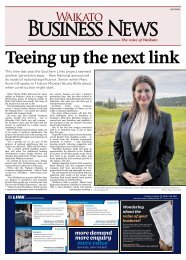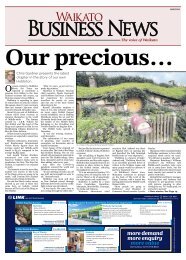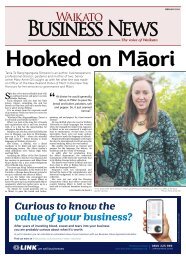Waikato Business News August/September 2020
Waikato Business News has for a quarter of a century been the voice of the region’s business community, a business community with a very real commitment to innovation and an ethos of co-operation.
Waikato Business News has for a quarter of a century been the voice of the region’s business community, a business community with a very real commitment to innovation and an ethos of co-operation.
You also want an ePaper? Increase the reach of your titles
YUMPU automatically turns print PDFs into web optimized ePapers that Google loves.
WAIKATO BUSINESS NEWS <strong>August</strong>/<strong>September</strong> <strong>2020</strong><br />
15<br />
How to Rank No 1 on Google<br />
When people search online for your products or services, you<br />
want your website to be found easily. But what does it take to<br />
rank No 1 in Google?<br />
I’ve lost count of the number<br />
of times a business<br />
owner or general manager<br />
has asked for my advice<br />
regarding, “How do we get our<br />
website higher in Google?” Or<br />
sometimes even more directly,<br />
“We launched a new site.<br />
Why isn’t it ranked #1?”<br />
We all know that Google<br />
is where people turn to find<br />
answers to … well, everything!<br />
According to Statcounter.com,<br />
94.7 percent of<br />
all search engine searches in<br />
NZ are done through Google.<br />
The nearest competitor is Bing<br />
with 3.21 percent!<br />
When people search for<br />
products or services related to<br />
your business, you want your<br />
website to be found easily. To<br />
get your website to rank well<br />
the most important thing to<br />
remember is that it won’t happen<br />
by accident. You want<br />
to rank No 1 … and so do<br />
all of your competitors! The<br />
organic rankings are a competition<br />
that you don’t win without<br />
considerable effort.<br />
Firstly, it’s important to<br />
clarify what “ranking” means.<br />
When you run a search on<br />
Google, the search results<br />
page usually starts with three<br />
to four ads. These look almost<br />
identical to the organic results<br />
but have the word “Ad” beside<br />
them. These results are not the<br />
rankings but are Google Ads<br />
(previous called “AdWords”).<br />
You need to be running paid<br />
Google Ads campaigns to get<br />
your ads to show there.<br />
Underneath the ads, if Google<br />
thinks you were searching<br />
for local results, Google is<br />
likely to show the “Google<br />
Snack Pack” – which shows a<br />
map and three results of local<br />
businesses near you.<br />
After that snack pack the<br />
first organic results are shown<br />
– this is what “rankings”<br />
refers to. The organic results<br />
are the webpages that Google<br />
determines are the most<br />
important for the phrase that<br />
was searched for.<br />
So, what does it take<br />
to get ranked No 1 in the<br />
organic results?<br />
The process of getting<br />
a website ranked higher is<br />
called “Search Engine Optimisation”,<br />
or “SEO” for short.<br />
At its most basic level SEO<br />
can be split into two sections:<br />
On-Page Optimisation and<br />
Off-Page Optimisation.<br />
On-Page Optimisation is<br />
based on the content and code<br />
on your website. It forms the<br />
foundation of your rankings<br />
and in my estimate accounts<br />
for 30-50 percent of your<br />
search engine ranking. However,<br />
without this foundation<br />
being done well, the other<br />
work that accounts for 50-70<br />
percent of your ranking won’t<br />
count for much. The foundation<br />
needs to be built first.<br />
Sometimes when a new<br />
SEO client starts with us, we<br />
find that the words they want<br />
to rank for aren’t even mentioned<br />
on their site! A very<br />
simple check you can do when<br />
you want to rank for a phrase<br />
is to check the content and see<br />
how many times that phrase,<br />
or close variants, are mentioned<br />
on your page.<br />
Next, check if those keywords<br />
are included in your H1<br />
(your main heading – which<br />
should be in an tag in the<br />
code). After that there are over<br />
30 other checks that should be<br />
made for your On-Page Optimisation<br />
for each page. These<br />
include hidden code, such as<br />
schema, user-experience tests<br />
such as page-loading speed<br />
and mobile responsiveness,<br />
internal linking throughout<br />
your site and many more.<br />
Reviewing the basic content<br />
can be done DIY, but after that<br />
it make sense to engage an<br />
SEO specialist.<br />
The other 50-70 percent of<br />
your results comes from Off-<br />
Page Optimisation, which is<br />
mostly other websites linking<br />
to your site.<br />
An easy way to think of it<br />
is that each website that links<br />
to your site is a vote. The more<br />
votes your site gets, the more<br />
important it is and the more<br />
likely it is to rank well. If an<br />
important site (one with lots<br />
of “votes”) links to your site,<br />
then its votes count for more<br />
than a non-important site linking<br />
to you. And if a site has<br />
strong content that relates to<br />
your products or services and<br />
links to you, then that counts<br />
more than a non-related site<br />
linking to you. This complexity<br />
is just scraping the surface<br />
THE DIGITAL WORLD<br />
> BY JOSH MOORE<br />
Josh Moore runs Duoplus, a Hamilton-based digital marketing<br />
agency that helps businesses get better results through highly<br />
measurable online marketing. www.duoplus.nz<br />
of how Google works. Building<br />
this complex and powerful<br />
process of identifying<br />
which sites are most important<br />
for billions of different<br />
search phrases, is why Google<br />
is so powerful.<br />
Overall, getting ranked<br />
takes consistent effort over<br />
time. It can take many months<br />
to build up rankings to compete<br />
for highly competitive<br />
keywords, but it can be well<br />
worth it. We’ve seen the<br />
investment pay off strongly<br />
for our SEO clients with the<br />
phone ringing constantly<br />
and work coming in the door<br />
because they’re found in the<br />
top spots of the search results.<br />
It’s a great feeling having<br />
your website ranked well,<br />
but just remember, it doesn’t<br />
happen by accident.<br />
Your recruitment<br />
asset in <strong>Waikato</strong>.<br />
For more than 30 years, we’ve been providing recruitment services to<br />
organisations across the region and ‘positioning excellence’ throughout <strong>Waikato</strong>.<br />
We work closely with our clients to ensure we find the right candidate for their company and position.<br />
We’re also able to tailor our various recruitment services to suit your situation.<br />
So if you are looking to hire, or would like to discuss your recruitment needs, get in touch with our team.<br />
Recruit with excellence. Recruit with Asset.<br />
07 839 3685 | www.assetrec.co.nz


















